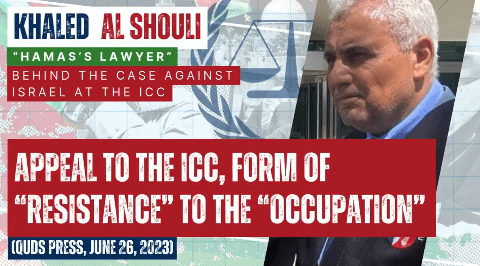|
Getting your Trinity Audio player ready...
|
Hamas-Affiliated Lawyer Khaled Al-Shouli Emerges as Pivotal Figure in ICC Campaign Against Israel
Edited by: Fern Sidman
Khaled Al-Shouli, a long-time Hamas-affiliated lawyer, has emerged as a pivotal figure in the ongoing legal campaign against Israel at the International Criminal Court (ICC). Known for his inflammatory rhetoric and controversial legal interpretations, Al-Shouli has played a central role in shaping the ICC’s approach to alleged war crimes, raising significant concerns about impartiality and adherence to international legal standards.
Well said Priti 👏🏼 now to start combating this blatant and absolutely shocking attack on democracy.
Khaled Al-Shouli, a Hamas lawyer, was not only the one behind this ICC decision but the EU’s decision to remove Hamas from the terror list.
How are we as a democratic nation,… https://t.co/6jY3LG9b6F
— Natalie_Zion (@natalie_Zion_) November 22, 2024
Al-Shouli’s record as a legal advocate is replete with statements and actions that illustrate his alignment with Hamas’s ideological and political agenda. In the aftermath of the October 7, 2023, Hamas-led attacks on Israel, Al-Shouli described the actions—which resulted in the barbaric murders of over 1,200 people and the kidnapping of more than 250 others—as legitimate “resistance” under international law. Speaking on Algeria’s Almagharibia channel just a day after the attacks, he framed them as a “reaction to Israeli violations,” despite the widespread condemnation of the attacks as acts of terrorism.
Who is Khaled Al-Shouli, one of the Hamas lawyers behind the ICC case against Israel
This longtime Hamas lawyer has quite the record: from calling October 7th “resistance,” suggesting that kidnapping civilians is legitimate under international law, and stating that there is no… pic.twitter.com/uMxLIqJNoQ
— Leslie Kajomovitz (@lkajomovitz) November 21, 2024
Al-Shouli’s defense extended to claims that such actions, including the abduction of civilians, could be legally justified. This perspective starkly contrasts with established international humanitarian law, which categorically prohibits the targeting of civilians and hostage-taking. His rhetoric has drawn sharp criticism for trivializing the gravity of crimes against civilians and undermining the principles enshrined in the Geneva Conventions.
Reminder: Khaled Al-Shouli, one of the key lawyers pushing the ICC’s bogus arrest warrants against Israel’s leaders, has troubling ties to Hamas:
🔸️Served as Hamas’s lawyer in 2014, directly representing the terror group in EU cases where he tried to get it removed from the… pic.twitter.com/DqsUfl54pm
— Eitan Fischberger (@EFischberger) November 21, 2024
As one of the driving forces behind the ICC’s pursuit of arrest warrants against Israeli officials, including Prime Minister Benjamin Netanyahu and former Defense Minister Yoav Gallant, Al-Shouli’s influence is palpable. The ICC’s chief prosecutor, Karim Khan, has faced mounting scrutiny over the court’s actions, which critics argue are heavily politicized and lack evidentiary rigor.
Al-Shouli has reportedly argued that evidence is not a prerequisite for issuing arrest warrants for alleged crimes, a position that contravenes the ICC’s own legal framework. Such an approach has been denounced by legal experts and governments as a dangerous precedent, risking the court’s credibility and perceived neutrality.
Al-Shouli’s close ties to Hamas are evident in his public endorsements of key figures within the organization. He has referred to Abu Obaida, the spokesperson for Hamas’s military wing, the Al-Qassam Brigades, as “our man,” further solidifying his role as an advocate for Hamas’s interests on the international stage. These affiliations cast doubt on his ability to operate independently as a legal professional and raise questions about the ICC’s reliance on individuals with overt partisan leanings.
Reminding everyone that one of the main figures behind the ICC case is Gilles Devers, one of the French lawyers who have been working with Hamas’s politburo for years. He is assisted by Khaled Al-Shouli who has had his own assets frozen in France because of his Hamas ties https://t.co/NeUb8qbFzI
— Melissa Chapman-Mushnick מרים (@MelissaSChapman) November 21, 2024
The ICC’s actions, influenced in part by Al-Shouli’s advocacy, have drawn significant backlash from Israel and its allies. Israeli officials have condemned the court’s issuance of arrest warrants as a politically motivated campaign that disregards the complexities of the Israeli-Palestinian conflict. International observers have also expressed concerns about the ICC’s susceptibility to politicization, warning that such developments could undermine its mission to deliver impartial justice.
Al-Shouli’s involvement in the ICC case against Israel highlights broader challenges facing international judicial bodies. The intersection of law and politics in cases involving deeply entrenched conflicts calls attention to the difficulty of maintaining neutrality and ensuring adherence to legal norms. Critics argue that Al-Shouli’s actions exemplify how legal mechanisms can be weaponized to advance political agendas, eroding trust in institutions such as the ICC.




